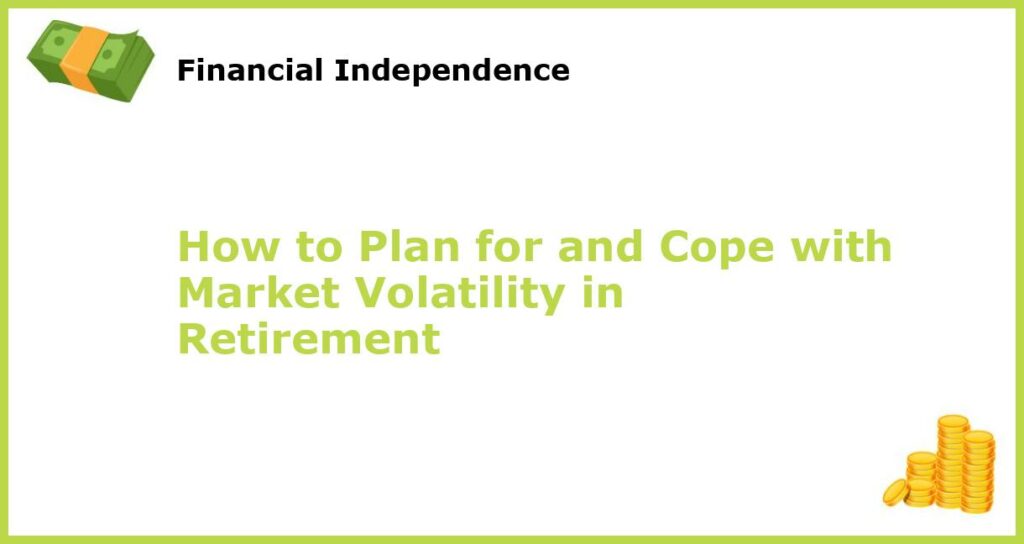Retirement is a time when you want to enjoy the fruits of your labor over several decades. However, market volatility can spoil it all by taking away a significant portion of your wealth. Therefore, it’s essential to understand market volatility and create a plan that helps you manage it. Let’s dive into some tips that can help you cope with market volatility during retirement planning.
Understand Market Volatility

Market volatility can be a real challenge for retirees who depend on their investments to fund their retirement. It is important to understand what market volatility is and how it can impact your retirement income. Simply put, market volatility refers to the tendency of the stock market to fluctuate up and down in value over short periods of time. Volatility can be caused by various factors such as economic uncertainty, political turmoil, and global events.
Market volatility can have a multifaceted impact on your retirement income. It can cause severe fluctuations in the overall value of your retirement portfolio, negatively impacting the income available. In the case of retirees dependent on income from their portfolio, these fluctuations can be devastating. Furthermore, it can give rise to a false sense of security when the market is on an upswing, causing retirees to take additional risks that may lead to substantial losses when market conditions inevitably shift.
Develop a Financial Plan

To cope with market volatility in retirement, the first step is to develop a solid financial plan that includes a diversified investment portfolio, a budget, and an emergency fund. A financial plan helps you to stay on track and make informed decisions about your income and expenses. It can also help you avoid making impulsive investment decisions that could hurt your retirement income in the long run.
A comprehensive financial plan should incorporate various areas such as income sources, retirement spending levels, tax-efficient distribution of retirement assets, and long-term legacy objectives. The budget forms the core of the financial plan, helping individuals understand their expenses, how much they have saved to fund these expenses, and how to allocate their resources. It is necessary to plan for expenses such as home maintenance, medical care, and long-term care, as these are not one-time expenses, but may occur regularly throughout retirement.
Stay Invested for the Long Term

A common mistake that retirees make when facing market volatility is to pull all their money out of the stock market and keep it in cash or low-yielding investments such as bonds. However, this strategy can be detrimental in the long run as it may result in missed opportunities for growth. Staying invested in a diversified portfolio that matches your risk tolerance can help you weather the ups and downs of the stock market and stay on track to meet your retirement goals.
One of the most effective ways to manage market volatility is to focus on maintaining a long-term strategy with well-diversified investments aligned to individual retirement goals rather than market trends. During times of market volatility, panic selling due to fear can lead to poor decisions affecting your retirement. Stick to your investment strategy unless you need to make a significant change based on your financial goals or other circumstances beyond market volatility.
Rebalance Your Portfolio Regularly

Frequent investment reviews and periodic portfolio rebalancing create an opportunity for aligning investment returns internally within a portfolio and set the right balance of risk exposure based on evolving circumstances. Rebalancing your portfolio involves selling some of your investments that have performed well and buying more of those that have underperformed. This helps to maintain a balanced portfolio and reduce risk. Regular rebalancing can be an effective way to manage market volatility and keep your portfolio on track to meet your retirement goals.
The strategy for rebalancing is designed to minimize exposure to more volatile markets or sectors in which an individual has become over-exposed. This rebalancing strategy is not a time-based strategy but a goal-based strategy. To do this, an individual will need to set strategy goals that take a big-picture approach and adjust for market conditions over time. The adjustment process should align with objectives and goals rather than timing the market.
Consider a Guaranteed Income Stream

To further cope with market volatility in retirement, consider adding a guaranteed income stream to your portfolio. This can be in the form of an annuity, which is a financial product that provides regular payments over a specific period of time or for life. An annuity can help supplement your other retirement income and provide a level of security in the event of market downturns. However, be sure to carefully consider the costs and fees associated with annuities before investing.
An annuity provides a monthly stream of income for life or a specified number of years. It entails transferring investment’s risk to an insurance company, which guarantees a steady payment for life or a certain time. An annuity can provide peace of mind during retirement as you have a guaranteed stream of passive income. Generally, annuity plans are reliable as compared with other investment options. Furthermore, individuals should always buy through a reputable insurer, carefully review the terms and costs associated with such products and assess how the annuity aligns with personal financial goals.
Work with a Financial Advisor

Market volatility can be stressful and overwhelming, especially if you are managing your retirement finances on your own. Working with a financial advisor can help alleviate some of this stress and provide you with valuable guidance and advice. A financial advisor can help you develop a personalized financial plan that takes into account your retirement goals, risk tolerance, and overall financial situation.
Financial advisers can provide an objective analysis of personal portfolios and use this insight to develop a comprehensive retirement plan that considers all factors relevant to your personal financial situation. Advice from an expert in the industry can help you efficiently manage and minimize risks associated with market fluctuations. A financial advisor also brings objectivity, discipline, and experience to the process of managing your retirement investment portfolio.
Avoid Emotional Investment Decisions

It is important to avoid making emotional investment decisions in the face of market volatility. Making impulsive decisions to buy or sell investments based on fear or greed can hurt your retirement income in the long run. Instead, focus on your long-term goals and stick to your financial plan. If you are feeling stressed or uncertain, consult with a financial advisor or take a break from monitoring your investments to regain perspective.
Selling your stock early, prematurely moving money to cash, and chasing after winners are classic mistakes to avoid. Emotional trading can cause significant losses by moving money at the wrong time, which can affect the long-term growth of an individual’s investment portfolio. Consequently, it is important to avoid making impulsive decisions based on emotions, context or irrelevant news.
Stay Up-to-Date on Market Conditions

Staying up-to-date on market conditions can help you make informed decisions about your investments. Follow financial news outlets, read industry publications, and consult with your financial advisor regularly. However, be cautious not to overreact to short-term market movements, as these can often be temporary and not indicative of long-term trends.
By staying up-to-date with market news and developments, you can understand the macro-level risks and respond accordingly. However, markets are highly unpredictable, and sudden changes may affect retirement portfolios. Therefore, investors should be cautious about making significant changes in their investments driven solely by short-term trends or news.
Consider Cash Reserves
Having cash reserves set aside can help you manage market volatility in retirement. This means having a portion of your retirement savings in cash or cash equivalents that can be accessed quickly in the event of an emergency or unexpected expenses. This can help reduce the need to sell off investments at a loss during market downturns.
Investors should have a minimum of six months of living expenses set aside in cash or cash equivalents accounts. This approach allows investors to keep their investment portfolios intact while they leverage could be liquidated in the event of unexpected expenses or emergencies.
Reassess Your Risk Tolerance
Lastly, it may be necessary to reassess your risk tolerance in the face of market volatility. If you find that you are losing sleep over your investments or are experiencing significant stress or anxiety, it may be time to adjust your portfolio to better match your risk tolerance. Consult with a financial advisor to determine the best course of action.
It is easy to assume that your risk tolerance should remain the same throughout your retirement, especially when you have a solid investment policy in place. However, it is worth reassessing over time, given the continued volatility of fintech. Market conditions, economic events, and life circumstances can all cause shifts in individuals’ risk tolerance.







